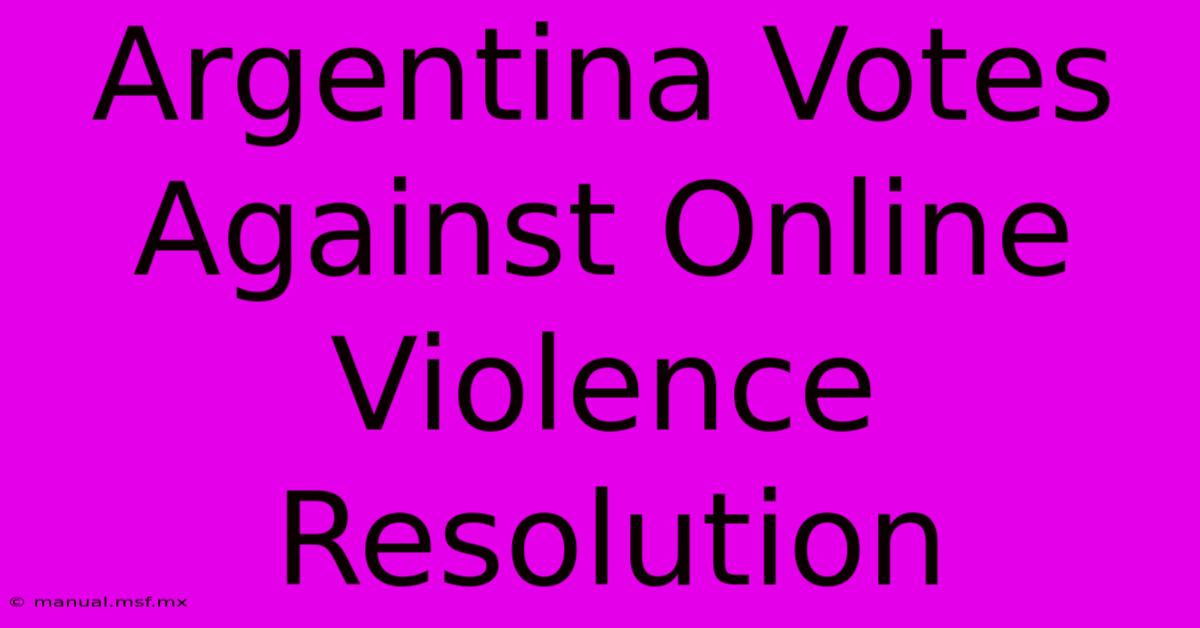Argentina Votes Against Online Violence Resolution

Discover more detailed and exciting information on our website. Click the link below to start your adventure: Visit Best Website. Don't miss out!
Table of Contents
Argentina Votes Against Online Violence Resolution: A Setback for Digital Safety?
Is Argentina falling behind in the fight against online violence? The recent rejection of a resolution aimed at combating this growing problem has sparked debate and concern.
Editor Note: Argentina's recent rejection of the resolution on online violence has ignited discussions regarding the country's commitment to digital safety. This development prompts a critical examination of the current state of online security in Argentina and the implications of this vote for the future.
This topic is crucial because online violence is a serious issue affecting individuals, families, and society as a whole. It impacts mental health, personal safety, and freedom of expression. Understanding Argentina's stance on this matter is essential for gauging the effectiveness of national and international efforts to curb this growing phenomenon.
Our Analysis: We delved into the intricacies of the resolution, examining its key provisions and the arguments presented by both proponents and opponents. We also explored the broader context of online violence in Argentina, including its prevalence, impact, and existing legal frameworks. This comprehensive review aims to provide valuable insights for policymakers, digital citizens, and those concerned about online safety.
Key Findings Regarding Online Violence in Argentina:
| Key Findings | Description |
|---|---|
| Prevalence of Online Violence | Argentina faces a concerning rate of cyberbullying, harassment, and hate speech online. |
| Impact on Mental Health and Well-being | Online violence can lead to anxiety, depression, and social isolation, affecting individuals' overall well-being. |
| Existing Legal Frameworks | While some laws address online violence, they may not fully encompass the complexities of the digital realm. |
| Challenges in Enforcement | Limited resources and technical expertise can hamper effective enforcement of existing laws. |
The Resolution's Rejection: A Turning Point?
The rejected resolution aimed to:
- Enhance Online Safety: By establishing a comprehensive framework for addressing online violence, including education, prevention, and intervention measures.
- Promote Responsible Online Behavior: Through awareness campaigns and educational programs targeting both individuals and institutions.
- Strengthen Legal Measures: By updating existing legislation to better address online violence and its various forms.
Arguments Against the Resolution:
- Concerns about Freedom of Expression: Some argued that the resolution might stifle freedom of speech and expression online.
- Lack of Clear Definitions: Concerns were raised about the lack of precise definitions for online violence, potentially leading to arbitrary interpretations.
- Practical Implementation Challenges: There were doubts about the feasibility of implementing the proposed measures effectively.
The Path Forward:
The rejection of the resolution does not necessarily mean the end of efforts to address online violence in Argentina. It does, however, raise important questions about the country's priorities and the strategies it will adopt moving forward.
Key Takeaways:
- Continued Advocacy is Vital: The need for ongoing advocacy and awareness campaigns to highlight the dangers of online violence remains paramount.
- Improving Digital Literacy: Educating individuals about online safety, responsible digital citizenship, and reporting mechanisms is critical.
- Addressing Legal Gaps: Continuously evaluating and updating existing laws to ensure they effectively address online violence is essential.
Navigating the Digital Landscape:
Cyberbullying: The pervasive nature of cyberbullying demands robust interventions, ranging from school programs to social media platform regulations.
Hate Speech: Argentina must grapple with the complex challenge of combating hate speech online without infringing on legitimate freedom of expression.
Misinformation and Disinformation: Strategies to combat misinformation and disinformation are crucial to safeguarding public trust and fostering informed online discourse.
The Need for Collaboration:
Addressing online violence requires a multi-stakeholder approach involving governments, civil society organizations, technology companies, educators, and individuals.
Closing Thoughts:
The rejection of the resolution represents a setback for efforts to combat online violence in Argentina. It underscores the complexities of navigating the digital landscape and the need for ongoing dialogue and collaboration. By fostering a culture of digital responsibility and building robust legal frameworks, Argentina can better protect its citizens from the harms of online violence.

Thank you for visiting our website wich cover about Argentina Votes Against Online Violence Resolution. We hope the information provided has been useful to you. Feel free to contact us if you have any questions or need further assistance. See you next time and dont miss to bookmark.
Also read the following articles
| Article Title | Date |
|---|---|
| Dans L Oeil De Lapierre 14 November | Nov 15, 2024 |
| Wie Is De Mol Seizoen 25 Deelnemerslijst | Nov 15, 2024 |
| Investigacion En Les Corts Mazon | Nov 15, 2024 |
| Dog Free Zones Making Outdoors Inclusive | Nov 15, 2024 |
| November 14th 2024 Birth Records | Nov 15, 2024 |
| Norge Vinner Pa Overtid | Nov 15, 2024 |
| Diputados Dudas Legales Tras Sesion Fallida | Nov 15, 2024 |
| Eva Longorias Us Exit After Trump | Nov 15, 2024 |
| Qualificazioni Mondiali Australia Arabia Saudita Pronostico | Nov 15, 2024 |
| Frederick Lau Kontroverse Bei Charity Gala | Nov 15, 2024 |
